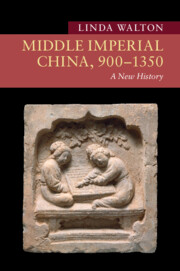Book contents
- Middle Imperial China, 900–1350
- New Approaches to Asian History
- Middle Imperial China, 900–1350
- Copyright page
- Dedication
- Contents
- Figures
- Maps
- Acknowledgments
- Introduction
- 1 The Turbulent Tenth Century
- 2 Song in a Multipolar World
- 3 Schooling, State, and Society in Song and Jin
- 4 An Economic Revolution?
- 5 Cities and Urban Life
- 6 Religious Transformations
- 7 Ways of Knowing
- 8 The Arts of Culture
- 9 Gendered and Generational Lives
- 10 Mapping the Built and Natural Environment
- 11 Sustaining Life and Healing Bodies
- 12 The Mongol Yuan Dynasty in China
- 13 Yuan China in the Mongol Eurasian Empire
- Bibliography
- Index
- New Approaches to Asian History
7 - Ways of Knowing
Learning and Knowledge
Published online by Cambridge University Press: 20 July 2023
- Middle Imperial China, 900–1350
- New Approaches to Asian History
- Middle Imperial China, 900–1350
- Copyright page
- Dedication
- Contents
- Figures
- Maps
- Acknowledgments
- Introduction
- 1 The Turbulent Tenth Century
- 2 Song in a Multipolar World
- 3 Schooling, State, and Society in Song and Jin
- 4 An Economic Revolution?
- 5 Cities and Urban Life
- 6 Religious Transformations
- 7 Ways of Knowing
- 8 The Arts of Culture
- 9 Gendered and Generational Lives
- 10 Mapping the Built and Natural Environment
- 11 Sustaining Life and Healing Bodies
- 12 The Mongol Yuan Dynasty in China
- 13 Yuan China in the Mongol Eurasian Empire
- Bibliography
- Index
- New Approaches to Asian History
Summary
The Confucian “way of knowing” was validated through classical texts that transmitted the wisdom of antiquity. Early Song rulers promoted Confucianism as the ideological foundation of the state, and the reformulation of Confucianism commonly known as “Neo-Confucianism” took place against the backdrop of the newly unified Song dynasty. Well before the Song, the establishment of government schools and the examination system institutionalized early ideals of learning, transforming them into knowledge useful for governing a bureaucratic state. During the Song, debates over the content of the examinations – and thus what kinds of knowledge were valued – were sparked by political disputes, but disagreements were also based on deeply held beliefs about the meaning of learning and the purpose of knowledge. The cosmological underpinnings of Confucianism were articulated and transmitted through new interpretations of the Classics in the Northern Song, synthesized and systematized by the Neo-Confucian thinker Zhu Xi (1130–1200). History was a way of knowing distinct from the Classics as a source of political and philosophical principles. The Jurchen Jin incorporated and adapted these ways of knowing with their own in their rule of the north. The introduction of print technology altered people’s relationship to texts and to the transmission of knowledge.
- Type
- Chapter
- Information
- Middle Imperial China, 900–1350A New History, pp. 167 - 190Publisher: Cambridge University PressPrint publication year: 2023

